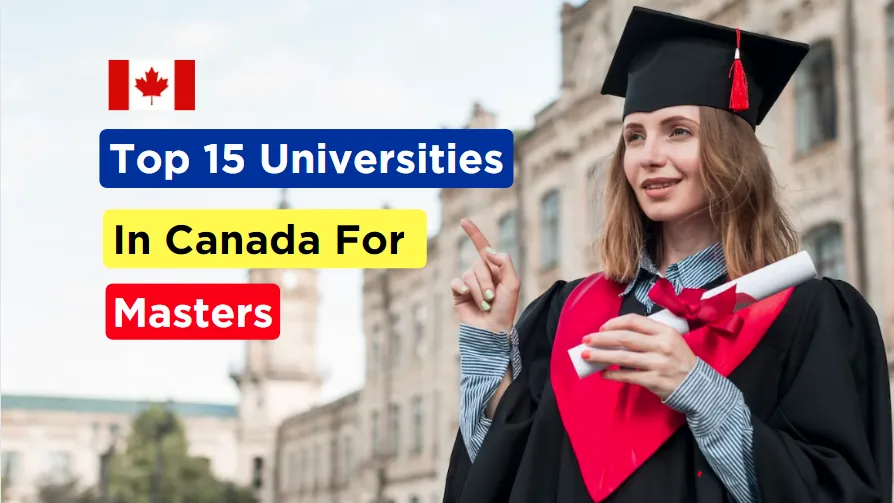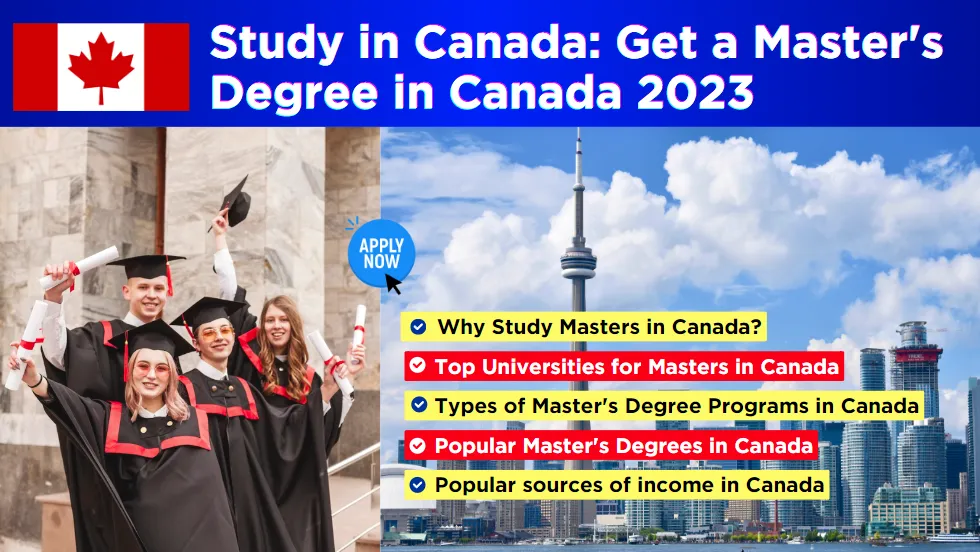According to the list, Canada is ranked third in the “Best Provinces for Education”. American News 2021 The country’s government has invested heavily in the education sector and is consistently striving to become an internationally recognized study destination.
Canadian institutions offer affordable courses and cost-effective living expenses, are known for their academic excellence, and have worked extensively in the field of research.
By studying for a master’s degree in Canada, you can not only benefit from a global presence in your field of interest but also delve deeper into the world of research.
In this blog, we take a look at the diverse courses and institutions that offer postgraduate programs in Canada.
This blog includes:
- Why study masters in Canada?
- Top Universities for Masters in Canada
- Types of Master’s Degree Programs in Canada
- Popular Master’s Degrees in Canada
- Popular sources of income in Canada
- Entry requirements
- Legal requirements
- Costs for a Master’s Degree in Canada
- Cost of living in Canada
- Popular trade fairs
- Postgraduate Work Permit in Canada
- Banned by Master in Canada
- The highest-paying industries in Canada
- Frequently Asked Questions
Study in Canada after 10th SPP in Canadian Colleges
Get all latest notification on our Telegram channel
Join TelegramWhy study masters in Canada?
Canada is home to more than 90 educational institutions and offers various master’s degrees in each field. In 2018, the Organization for Economic Co-operation and Development (OECD) ranked Canada as the most educated country in the world, with more than 56% of adults having some form of education after completing high school.
Canadian universities and colleges offer globally recognized master’s degrees in almost every field, including medicine, politics, technology, continuing education, and the media, among others. Let’s take a look at the top reasons why choosing a master’s degree program in Canada can help you get closer to your career goals:
- Research is becoming more and more important in postgraduate programs offered in Canada. Academic institutions encourage graduate students to study in depth in their chosen field and pursue research opportunities to gain knowledge beyond just a degree.
- The following applies to postgraduate programs: Costs of studying in Canada Relatively cheaper than normal countries Great Britain And that’s it. United States
- International students can choose from a number of attractive scholarships offered by Canadian universities, specifically designed for deserving candidates in search of an affordable education. When it comes to master’s programs in Canada, there are a wide range of financial aid programs that give students the financial support they need to pursue their dream program.
- Additionally, if you want to try full-time jobs after completing your bachelor’s degree in Canada, you can apply for a work permit, which can be obtained through a relatively simplified process.
Read More: How To Apply For A Work Permit As A Student In Canada
Top Universities for Masters in Canada

From management to fine arts, students can choose from a wide range of postgraduate courses from Canadian universities. The table below shows some of the most popular universities and courses you should consider when considering your options for studying for a master’s degree in Canada:
Get all latest notification on our Telegram channel
Join Telegram| Name of the University | QS World University Rankings 2022 | World University Rankings |
| University of Toronto | 26 | 18 |
| McGill University | =27 | 40 |
| University of British Columbia | 46 | 34 |
| University of Montreal | 111 | =73 |
| University of Alberta | 126 | =131 |
| McMaster University | 140 | 69 |
| University of Waterloo | =149 | 201-250 |
| Western University | 170 | 201-250 |
| Dalhousie University | = 272 | 251-300 |
| Laval University | =414 | – |
| Queen’s University | =240 | 251-300 |
| Simon Fraser University | =298 | 251-300 |
| University of Manitoba | 601-650 | 351-400 |
Types of Master’s Degree Programs in Canada
Master’s degrees (also known as “degree” programs) are offered in several programs in Canada. Students can choose a suitable program and also choose their niche for specialization. Below are some of the most popular types of masters in Canada.
- Master of Arts (MA)
- Master of Science (MSc)
- Master of Fine Arts (MFA)
- Master of Engineering (MEng)
- Master of Technology (MTech)
- Master of Business Administration (MBA)
- 1 year Master’s degree in Canada
- 2 years of PG Diploma
Popular Master’s Degrees in Canada
In Canada, a master’s degree includes not only typical lectures and exercises but also excursions, projects, and group work.
These represent the majority of credits in most master’s programs. With so many study options, students often choose cheap master’s programs in Canada.
Read More: How to Apply for Visa-Sponsored Government Jobs in Canada
However, they need to consider other factors such as program availability, placement, and rankings. The table below lists the most common master’s degrees in Canada, as well as some of the top universities in the country that offer them:
| University | A popular course |
| University of Toronto | Master in Media Studies |
| McGill University | Master of Management in Analytics |
| University of Dundee | Master of Education |
| University of British Columbia | MS in Electrical Engineering and Information Technology |
| Trent University | Master of Management |
| Westford University College | Master in International Business |
| Adler University | Master-Psychology |
| Royal Roads University | Master of Global Management |
| Saint Mary’s University | International Master in English Teaching |
| University of Lethbridge | Master of Fine Arts |
| Digital Media Center | Master of Digital Media |
| Vancouver School of Theology | Master of Divinity |
| Wycliffe College | Master in Theological Studies in Development |
| Global Alliance in Management Education | Master in International Management |
| University of Quebec Enautois | Master in Social Science of Development |
This will help you explore more educational institutions in Canada:
The Top 10 Colleges in Canada: Everything You Need to Know
Popular sources of income in Canada

Many universities offer three popular courses for admission to master’s programs: fall, winter, and summer. Autumn consumption is the most popular in the country, followed by winter and summer.
| Inputs | Applications will start | Beginning month |
| Val | June | September |
| winter | Nov | January |
| Summer | February | April May |
Entry requirements
Since there are several institutions in Canada that offer different master’s degrees, admission criteria may vary from university to university. Below, we have listed some general eligibility criteria that you should consider when applying for a Master’s degree in Canada for any degree program:
- A certificate of completion equivalent to a Canadian Master’s degree, i.e., H. 10+2 and 3 or 4 years post-graduation
- Countable professional experience in your chosen field
- For example, English language tests (IELTS) are required as an integral part of the postgraduate application process in Canada.
- Candidates who want to opt for engineering or management courses also have to clear the qualifying exams. GMAT ingo.
- Declaration of Intent (SOP) and Letters of Recommendation (LOR)
- Prove that you have enough money to study in Canada.
- Updated CV (if required)
- If you apply for a Master in Canada or a PhD program, you may need to provide two academic letters of reference in addition to previous employment letters. If you have never studied in Canada, you will need an ECA (Educational Credential Assessment).
Don’t forget to check out the list of important documents required to enter Canada!
Legal requirements
To apply for a traditional master’s degree in Canada, certain legal procedures must be followed. From entry requirements to visa requirements, here are some things to consider when studying in Canada:
- In light of the global pandemic, the Canadian government is not currently issuing student visas. However, students who wish to attend university in Canada should research their preferred universities, as many Canadian colleges and universities offer admission letters to international students.
- When the situation returns to normal, students will need to apply for a visa valid for the duration of their studies, including the period of internships and part-time employment.
- To work part-time in the country, students must apply to the Canadian authorities for a temporary work permit. Universities ensure that part-time jobs do not hinder the progress of studies.
- Students must have sufficient financial resources to pay tuition fees and cover living expenses.
Costs for a Master’s Degree in Canada
International students need to spend an average tuition fee of CAD 18,000 (INR 9,54,000) per year to pursue a master’s degree in Canada. Average cost of a college executive MBA The tuition fee for regular courses is CAD 57,000 (INR 30,31,000). MBA The programs cost around CAD 28,000 (INR 14,75,000). Below are the average estimated tuition costs for pursuing a bachelor’s degree:
| University | Average Annual Tuition Fees (in CAD) | Average Annual Tuition Fee (in INR) |
| University of Toronto | 37.897 | 23 lakhs |
| University of British Columbia | 8.592 | 5.2 lakhs |
| McGill University | 18.110 | 10.9 lakh |
| McMaster University | 17.093 | 10.3 lakh |
| University of Montreal | 24.558 | 14.91 lakhs |
| University of Alberta | 9.465 | 5.74 lakhs |
| University of Ottawa | 25.718 | 15.61 lakh |
| University of Waterloo | 14.084 | 8.55 lakhs |
| Western University | 117.500 | 71.35 lakhs |
| University of Calgary | 14.538 | 8.82 lakhs |
Cost of living in Canada
Below is an overview of the various costs you need to consider while calculating the cost of studying and living in Canada for Indian students.
| Cost of living in Canada | cost |
| Flight expenses | INR 1,00,000-2,00,000 per flight |
| Study permit fees | 150 $ (11,123 INR) |
| Work permit fees | 155 $ (11.493 INR) |
| IELTS test cost | INR 14,700 |
| Accommodation | 5,000 CAD–10,000 CAD (INR 2,67,000–INR 5,39,000) per annum |
| Travel expenses | 80 CAD–110 CAD (INR 4,300–INR 6,000) per month |
| Health insurance | CAD 300-CAD 800 (INR 17.000-INR 44.000) |
| Food | CAD 300–CAD 400 [INR 17,508–23,344] (Monthly) |
| Entertainment | 750 CAD [43,770 INR] (monthly) |
Use our exclusive cost of living calculator to calculate your adjusted cost of living in Canada!
Popular trade fairs
A list of the following scholarships is available in Canada for Indian students:
- Vanier Canada Graduate-Stipendiary
- University of Waterloo International Masters and Doctoral Awards
- Ontario-Graduertenstipendium
- University of Manitoba Graduate Scholarship
- University of Calgary Graduate Awards and Scholarships
- Ontario Trillium Fund
- UBC Graduate Global Leadership Fellowships
- Trudeau Foundation Scholarships
Postgraduate Work Permit in Canada
For higher education, students seeking global studies are flocking to Canada. The availability of a friendly policy is one of the important criteria for getting a work visa in Canada.
Graduates of top Canadian schools can obtain a three-year work permit that can then lead to permanent residency. Students seeking a master’s degree in Canada can apply for a work permit (PGWP) after completing their studies.
PGWP is an unrestricted work permit that allows students to work for any employer in Canada. The application depends on the duration of the academic program. PGWP has a maximum tenure of 3 years.
To be eligible, a student must apply for a postgraduate work permit within 180 days of completing their program and receiving transcripts.
Banned by Master in Canada
After completing his master’s degree, a student can look for career opportunities. Whether it is an internship or another opportunity to find a job, qualified jobs are in great demand among students.
Some of the careers a student can pursue after earning a bachelor’s degree in any subject in Canada are:
- Business Analyst
- Project Manager
- Data Scientist
- Commercial manager
- Software developer
- Financial Analyst
- Research scientist
- Personnel Manager
- Environmental Consultant
- Health Administrators
Do you know how to get a Canadian student permit?
The highest-paying industries in Canada
Some of the popular areas you can explore after completing your master’s degree in Canada include:
| Zone | Average expected salaries in CAD per year | Average expected salaries in INR per year |
| CS-IT | 62,000 or more | 37.63 lakhs |
| Electrical Engineering | 75,000 or more | 45.52 lakhs |
| Civil engineering | 48,000 or more | 29.13 lakhs |
| Mechanical engineering | 50,000 or more | 30.35 lakhs |
| Data science and machine learning | 65,000 or more | 39.45 lakhs |
Note: International candidates can apply for permanent residency or PR after studying and working in Canada. Candidates who become permanent citizens receive most of the benefits available to Canadian citizens; they can work or study anywhere in the country and apply for Canadian citizenship.
Frequently Asked Questions
How much does a master’s degree cost in Canada?
Tuition fees can range from CAD$2,500 (INR 1,50,587) to CAD$18,000 (INR 10,84,233.30). The total cost may be higher or lower, depending on your personal lifestyle.
Is Canada good for master’s degrees?
Canada is one of the leading countries in the world for master’s degrees. Universities like the University of Toronto, the University of British Columbia, and McGill University are among the top 50 universities in the QS World Ranking 2022.
How do you qualify for MS in Canada?
To study in Canada, students need a three- to four-year master’s degree, IELTS scores, LORS, and SOP.
What masters should I do in Canada?
Some of the most popular courses in Canada are MBAs for Masters, Engineering, Nursing, Psychology, International Relations, Data Science, Management, Agricultural, and Environmental Sciences.
How long does it take to get a master’s degree in Canada?
In Canada, it takes one to two years to earn a full-time master’s degree from one of the country’s universities. Part-time postgraduate courses, on the other hand, last between 2 and 6 years and can be completed through online seminars, evening modules, or distance learning.
Can international students pursuing a master’s degree in Canada work part-time?
Yes, international students can work up to 20 hours per week during course periods. You can work full-time during the holidays.

